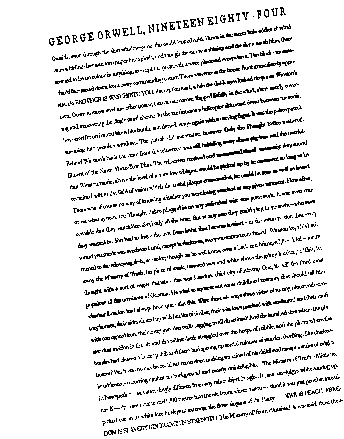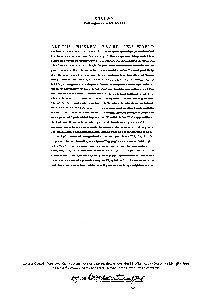Palimpsest und Moiré

OCR-Scan (Texterkennung über Scanner. Lesefehler unkorrigiert)
Laserausdruck mit Stempeln auf Papier
Teil der Edition „Einstieg 13g“, Edition Klöckner, Düsseldorf
George Orwell, Nineteen Eighty-Four;
Aldous Huxley, Brave New World;
Platon, Der Staat, Höhlengleichnis

George Orwell, Nineteen Eighty-Four
Outside, even through the shut window-pane, the world looked cold. Down in the street little eddies of wind were whirling dust and torn paper into spirals, and though the sun was shining and the sky a harsh blue, there seemed to be no colour in anything, ex- cept the posters that were plastered everywhere. The black- moustachio’d face gazed down from every cornmanding cornrr. There was one on the house-front immediately opposite. slo BROTHER IS WATCHII\TC YOU, the caption said, while the dal-k eyes looked deep into Winston’s own. Down at street level an- other poster, torn at one corner, flapped fitfully in the wind, alter- nate!y covering and uncovering the single word rNcsoc. In the far distance a helicopter skimmed down between the roofs, hov- ered for an instant like a bluebottle, and darted away- again with a curving flight. It was the police patrol, snooping into people’s windows. The patrols did not matter, however. Only the Thought Police mattered. Behind Winston’s back the voice from the telescreen was still babbling away about pig-iron and the overfulfilment of the Ninth Three-Year Plan. The telescreen received and transmitted simul- taneousiy. Any sound that Winston made, above the level of a very low whisper, would be picked up by it; moreover, so long as he remained within the field of vision which the metal plaque commanded, he could be seen as well as heard. There was of course no way of knowing whether you were being watched at any given moment. How often, or on what system, the Thought Police plugged in on any individual wire was guesswork. It was even con- ceivable that they watcleRrrvi&rybody all the time. But at any rate they could plug in yourwire~whenever they wanted to. You had to live – did live, from habit that became instinct – in the assump- tion that every sound you made was overheard, and, except in darkness, every movement scrutinized. Winston kept his back turned to the telescyeeg,d~It, w~ safer; though, as he well knew, even a back can bdrm;ea7;ii-~ A kilo- metre away the Ministry of Truth, his place of work, towered vast and white above the grimy landscape. This, he thought with a sort of vague distaste – this was London, chief city of Airstrip One, it- self the third most populous of the provinces of Oceania. He tried to squeeze out some childhood memory that should tell him whether London had always been quite like this. Were there al- ways these vistas of rotting nineteenth-century houses, their sides shored up with baulks of timber, their windows patched with cardboard and their roofs with corrugated iron, their crazy gar- den walls sagging in all directions? And the bombed sites where the plaster dust swirled in the air and the willow-herb straggled over the heaps of rubble; and the places where the bombs had cleared a larger patch and there had sprung up sordid colonies of wooden dwellings like chicken-houses? But it was no use, he could not remember: nothing remained of his childhood except a series of bright-lit tableaux,~occurring against no background and mostly unintelligible. The Ministry of Truth – Minitrue, in Newspeak * – was start- lingly different from any other object in sight. It _asa~cn~iplgys white soaring up, ter- K~-~’y race after terracP 300 metres into the air. From where mston~~ stood it was just possible toread, picked out on its white face in elegant lettering, the three slogans of the Party: WAR IS PEACE FREEDOM IS SLAVERY IGNORANCE IS STRENOTH The Ministry of Truth c9ntained, it was said, three thou-

Aldous Huxley, Brave New World
wantthe-whip.‘ Others at once took up the cry, and the phrase was repeated again and again, more and more loudly, until no other word was being spoken. ‚Wewant-thewhip.‘ At this moment yet another helicopter arrived. When it landed, the door opened and out stepped, first a red- faced young man, then, in green synthetic velvet shorts, white shirt and smart cap, a young woman. At the sight of the young woman the Savage turned pale and ft·ll back. The young woman stood, smiling at himan uncertain smile, a smile intended to calm him. The seconds passed. Her lips moved. She was saying something; but the sound ofher voice was drowned by the shouts ofthe crowd. ‚We-wantthewhip! Wewant-the-whip!‘ The young woman pressed both hands to her left side, and on that face of hers with its doll-like prettiness appeared an unusual expression of distress. Her blue eyes see~ped to grow larg-er, brighter; and suddenly two tears rolled down her cheeks. Her mouth moved again, though her words could not be heard. Then, with a quick move- ment oi passion, she stretched out her arms towards the Savage and stepped forward. ‚Wewan t-thewhip ! We—wan t . . . ‚ And all ofa sudden they had what they wanted. ‚Shameless!‘ The Savage had rushed at her likc a madman, striking hcr with his whip ofsmall cords. She had turned to run from him in terror, had caught her foot in the roots of the bushes and had fallen on her face in the long grass.’Henry, Henry!‘ she shouted. But her red-faced companion had run away and hidden behind the helicopter. The crowd rushed towards the spot where the Savage stood, striking at that soft body lying in the grass. ‚Oh, the flesh, the flesh !‘ The Savage ground his teeth. This time it was on his own shoulders that the whip descended. Drawn by the strange attraction of the horror of pain, and driven on by that habit of cooperation, that desire to act as all others acted, that their conditioning had rooted in them, they began to imitate his maddened action, striking at one another as the Savage struck at his own flesh or at that shapely, shameless body twisting and turning in pain in the grass at his feet. ‚Kill it, kill it, kill it. . .‘ the Savage went on shouting. Then suddenly somebody started ‚Orgy-porgy‘, and in a moment they had all caught up the tune and, singing, had begun to dance. Orgy-porgy, round and round and round, heating one another in time to the song. Orgy- pO’gy · · It was after midnight when the last of the helicopters took its Aight. Stupid with soma, and exhausted by his own passions, the Savage lay sleeping in the rough grass. The sun was already high when he woke. He lay for a moment, then suddenly rememberedeverything. ‚Oh, my God, my God !‘ He covered his eyes with his hand. .That evening the sky was black with helicopters making their way across the sky to the lighthouse in an end-

Platon, Der Staat, Höhlengleichnis
voller Glanz und kann kein einziges von den Dingen sehen, die wir wirklich nennen.< >Nein, wenn es plötzlich geschieht, nicht.< >Er muß sich an das Licht gewöhnen, wenn er die Gegen- stände oben sehen will. Zuerst wird er wohl am besten die Schatten erkennen, später die Spiegelungen von Menschen und anderen Gegenständen im Wasser, dann sie selber. ~T~eiter wird er die Himmelskörper sehen und den Himmel selber, und zwar besser bei Nacht die Sterne und den Mond, als bei Tage die Sonne und ihre Strahlen.< >Freilich.< >Schließlich wird er in die Sonne selber sehen können, also nicht bloß ihre Spiegelbilder im Wasser und anderswo hier unten erblicken, sondern sie selber oben an ihrem Ort. Er wird ihr Wesen begreifen.< >Unbedingt.< >Und dann vermag er den Schluß zu ziehen, dalJ sie es ist, die Jahreszeiten und Jahre hervorbringt, die über die ganze sichtbare Welt waltet und von der in gewissem Sinne alles, was man sieht, ausgeht.< >Es ist klar, daD er hierhin zuletzt gelangt.< >Nun weiter! Wenn er jetzt an die alte Wohnung zurück- denkt und an die dortige Weisheit und an seine Mitgefan- genen, so preist er sich doch glücklich über den Wechsel und bedauert jene.< ,C;ewiß.< >Und wie denkt er über die Ehrungen ~rnd Lobsprüche und Geschenke, die man da unten voneinander erhielt? Näm- lich dann, wenn einer die vorbeikommenden Schatten recht genau erkannte und sich am besten einprägte, welche zu- erst, welche nachher und welche zu gleicher Zeit zu er- scheinen pnegten, wodurch er denn die in Aussicht stehen- den gut erraten konnte. Wird es ihn noch danach verlan– gen? Wird er die Leute beneiden, die unten in Ansehen stehen und die Macht in Händen haben? Oder wird es ihm so ergehen wie es bei Homer steht? Das heißt, wird er weit lieber Ackerknecht bei einem armen Manne sein und alles aushalten wollen, als jenen Wahn teilen und jenes Leben führen ?< >Ja, ich glaube, er erträgt lieber alles, als daß er jenes Leben fÜhrt.< >Uenke dir nun auch dies: er stiege wieder hinunter und setzte sich auf den alten Platz. Wird er nicht die Augen voller Finsternis haben, wenn er so plötzlich aus der Sonne kommt ?< >Ganz und gar.< >Und während seine Augen also noch stumpf sind und hin und her irren, müßte er um die Wette mit den dauernd 517 Gefangenen wieder jene Schatten zu erkennen suchen. Neh- men wir nun noch die Zeit, bis er sich an das Dunkel ge- wöhnt hat, nicht ganz kurz an, so wird man ihn doch aus- la·cl~en und sagen, er käme von seinem Aufstieg mit schlech- ten Augen zurück. Es lohne sich nicht, den Versuch zum Aufstieg zu machen. Wer aber andere freimachen und hin- aufführen will, den wird man töten, wenn man seiner hab- haft wird und ihn töten kann.< ,GeiYiß.< >Nun mußt du dies ganze Gleichnis mit unserer vorauf- gegangenen Darlegung zusammenhalten, lieber Glaukon. Setze an Stelle der Gefängniswohnung die durch den Ge- sichtssinn offenharte Welt und an Stelle des lichtspenden- den Feuers die Kraft der Sonne. Wenn du dir ferner unter dem Aufstieg und dem Kennenlernen der Oberwelt die Wanderung der Seele zur denkbaren Welt hinauf denkst, so verstehst du meine Meinung, die du ja zu hören wünschst, durchaus richtig. Gott weiß, ob ich die Wahrheit gefunden habe! Meine Ansicht jedenfalls geht dahin, daß es in der erkennbaren Mielt die Idee des Guten ist, die man